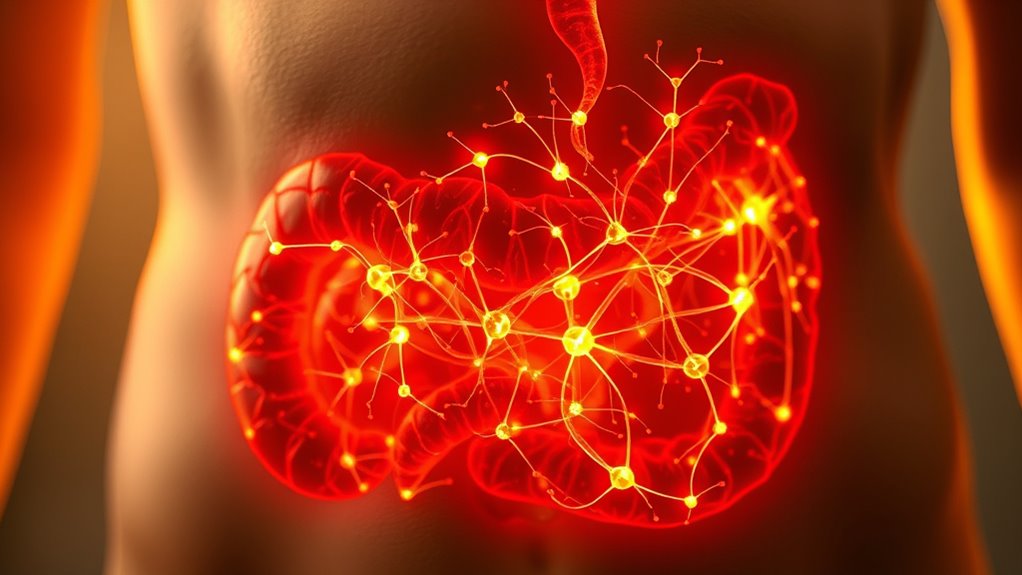Your gut feelings come from complex biological processes that quickly process subconscious signals from your body, like heart rate and muscle tension. These signals help your brain evaluate situations instantly, often before you’re consciously aware of it. Learning to recognize and trust these bodily cues can guide better decisions, combining instinct with rational thought. If you want to understand how your body and mind work together to shape your intuition, there’s more to discover below.
Key Takeaways
- Gut feelings originate from subconscious processing of physiological signals like heart rate and muscle tension, rooted in the nervous system.
- Emotional intuition involves rapid, automatic assessments based on past experiences and current cues, aiding quick decision-making.
- Physiological responses such as butterflies or increased heart rate provide subconscious guidance before conscious awareness.
- Recognizing and interpreting bodily sensations enhances trust in intuition, especially when combined with rational analysis.
- Developing awareness and practice helps differentiate genuine instincts from fleeting emotions, strengthening confidence in gut feelings.

Your gut feelings often seem like instinctive flashes, but science reveals they’re rooted in complex biological processes. When you have a hunch or an intuitive sense about a situation, it’s not just your imagination; your body and brain are communicating in ways you might not fully realize. This interplay is largely driven by emotional intuition and physiological signals that your nervous system continuously monitors and interprets.
Emotional intuition is your subconscious way of processing past experiences, current context, and possible outcomes. It’s a rapid, automatic assessment that helps you make quick decisions without deliberate analysis. When your brain detects subtle cues—like a flicker of discomfort or a sense of excitement—these signals are often rooted in emotional memories stored deep in your subconscious. Your brain essentially creates a mental shortcut, allowing you to respond swiftly to complex situations based on these implicit associations.
Simultaneously, physiological signals play an indispensable role. Your body is constantly sending signals—racing heartbeat, butterflies in your stomach, tension in your muscles—that serve as physical manifestations of your emotional state and instinctive judgments. These signals are processed by your autonomic nervous system, which manages involuntary functions. For example, if you’re sensing danger, your body might react with increased heart rate and sweaty palms even before your conscious mind fully registers the threat. These physiological cues act as internal barometers, often providing early warning signs or reassurance, guiding your decisions without you consciously realizing it.
Understanding how these signals work together can help you trust your gut again. Instead of dismissing your feelings as mere intuition or random bodily reactions, recognize them as integrated responses born from complex biological processes. When faced with important choices, take a moment to tune into what your body is telling you. Are you feeling anxious, excited, or uneasy? These emotional and physiological signals often carry valuable information, especially when paired with your rational mind. Additionally, advances in predictive modeling are helping to analyze these kinds of signals to improve decision-making and personalized responses.
Learning to interpret these signals takes practice, but it’s worth the effort. By paying attention to your emotional intuition and physiological responses, you develop a more nuanced understanding of your own instincts. Over time, you’ll become better at distinguishing genuine gut feelings from fleeting emotions or physical sensations. Trusting your gut again isn’t about abandoning logic; it’s about recognizing the sophisticated biological dialogue happening inside you and integrating it into your decision-making process. In doing so, you harness your body’s natural wisdom, making you more confident and aligned with your true instincts.
Frequently Asked Questions
Can Gut Feelings Predict Future Events Accurately?
Gut feelings can sometimes predict future events because your neural pathways process subconscious cues from experiences and emotions. These cues often guide your intuition without you realizing it. While they aren’t always accurate, trusting your gut can help you make quick decisions, especially when logic isn’t enough. However, it’s important to balance intuition with rational thought, as subconscious cues aren’t foolproof and can occasionally mislead you.
How Do Emotions Influence Gut Intuition?
Emotions are the compass guiding your gut intuition, like a lighthouse in a foggy night. They influence emotional processing, helping you pick up on subconscious cues your mind might overlook. When you’re feeling anxious or excited, these emotions heighten your sensitivity, making your intuition more attuned to subtle signals. Trusting these feelings means recognizing how your emotional state colors your subconscious cues, helping you make more instinctive, confident decisions.
Are Gut Feelings Reliable in High-Stakes Decisions?
In high-stakes decisions, gut feelings can be tricky because intuitive biases and decision heuristics might cloud your judgment. While your instincts can sometimes be accurate, they aren’t foolproof. Trust them when they’re backed by experience and evidence, but also take a step back to analyze the situation. Combining intuition with rational thinking helps balance quick insights with careful decision-making, making your gut feelings more reliable.
What Role Does Gut Health Play in Intuition?
Did you know your gut health influences your intuition? When your microbiome balance is maintained, it optimizes nerve signaling between your gut and brain, sharpening your instincts. This connection means that a healthy gut can enhance your ability to sense what’s right, often before your conscious mind catches on. So, paying attention to your gut isn’t just about digestion—it’s about trusting your inner wisdom more reliably.
Can Training Improve Your Gut Feeling Accuracy?
Yes, training can improve your gut feeling accuracy by strengthening neural pathways that process subconscious cues. By paying attention to your body’s signals and practicing mindfulness, you become more attuned to subtle sensations. Over time, this enhances your ability to interpret gut signals correctly, making your intuition more reliable. Consistent awareness exercises help you better connect with your body’s wisdom, sharpening your instinctive responses.
Conclusion
Remember, trusting your gut isn’t about ignoring reason; it’s about tuning into that quiet inner voice. Sometimes, your intuition hints at truths your mind hasn’t fully grasped yet. By gently listening and balancing feelings with facts, you’ll find a more harmonious path forward. Even when doubts whisper softly, don’t dismiss the subtle signals—they might just be guiding you toward clearer, more authentic choices. Embrace your instincts as gentle guides on your journey.










